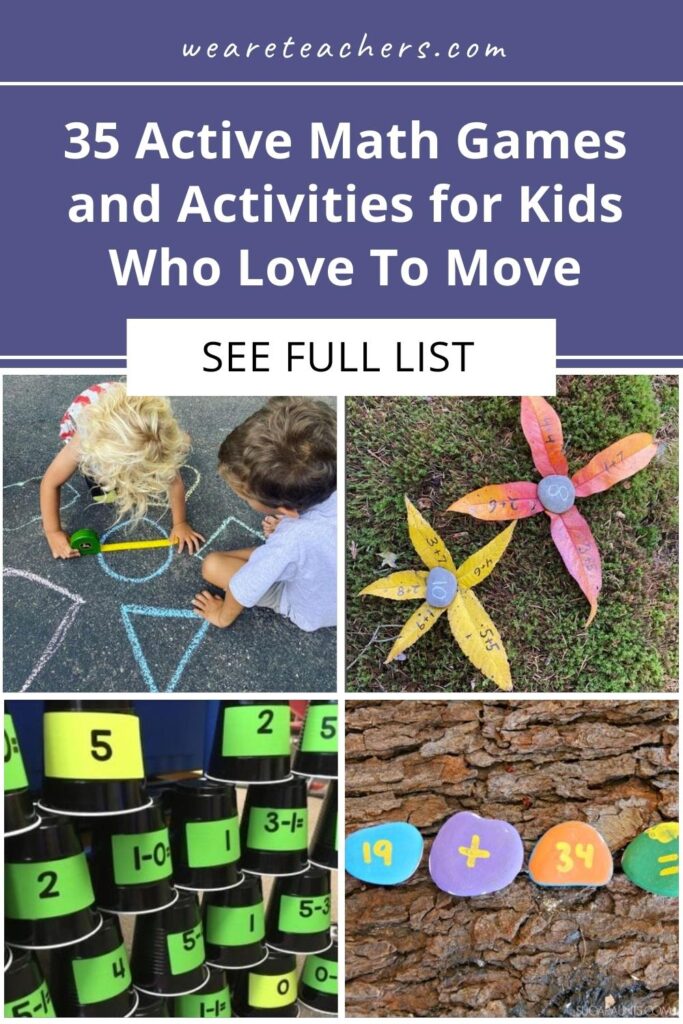35 Active Math Games and Activities for Kids Who Love To Move
Tired of hearing groans when you announce it’s time for math? These active math games and activities will spice up your learning game. They get kids up and moving, using their whole bodies to learn facts and skills. Lots of these ideas can be adapted to suit a variety of math concepts, so choose a few to try out with your own math students.
Mục lục bài viết
1. Throw snowballs inside or out
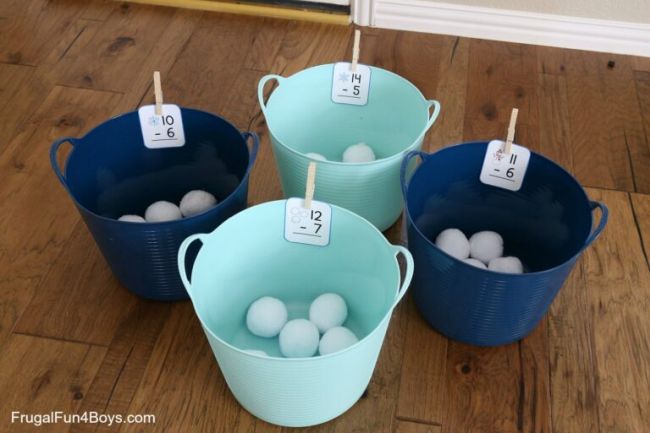
Clip flash cards to plastic tubs, then challenge kids to throw the correct number of large white pom-poms (“snowballs”) in from a distance. If there’s snow on the ground, bundle up and take this one outside to use real snowballs!
Learn more: Frugal Fun 4 Boys and Girls
2. Stack sticks to practice tally marks
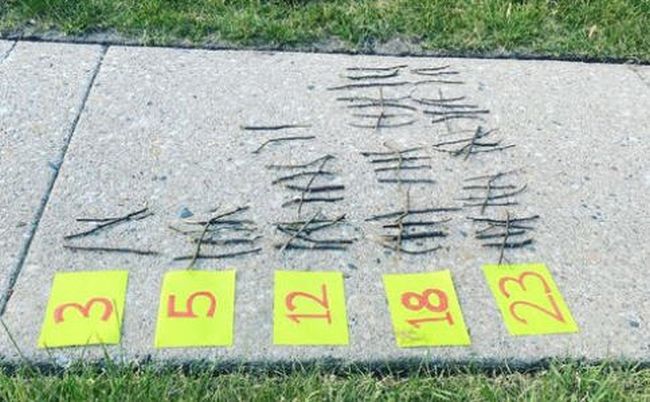
Small sticks are perfect for practicing tally marks. Kids will have fun checking the ground under trees for twigs, then breaking them into pieces and creating tally piles.
Learn more: @amysam623
3. Fish for numbers
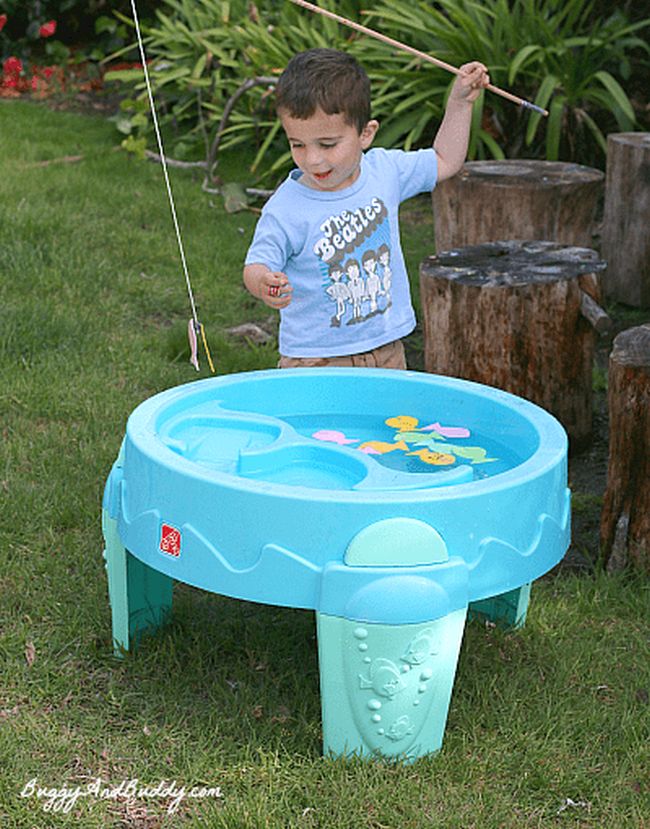
It’s so easy to make your own magnet fishing pole. Float some numbered foam fish with paper clips attached, then try to catch the numbers in the right order! (Don’t want to get wet? Just lay the fish on the ground instead.)
ADVERTISEMENT
Learn more: Buggy and Buddy/Fishing Math
4. Draw and measure shapes on the sidewalk
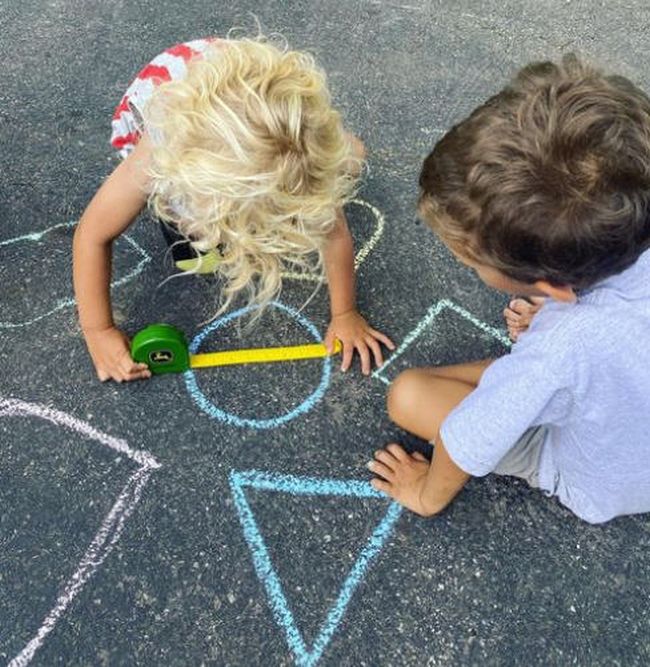
First, give kids some sidewalk chalk and let them draw a variety of shapes, as big or small as they like. Then, arm them with measuring tapes and have them practice taking measurements.
Learn more: @playexploregrow
5. Stomp and smash on a number line
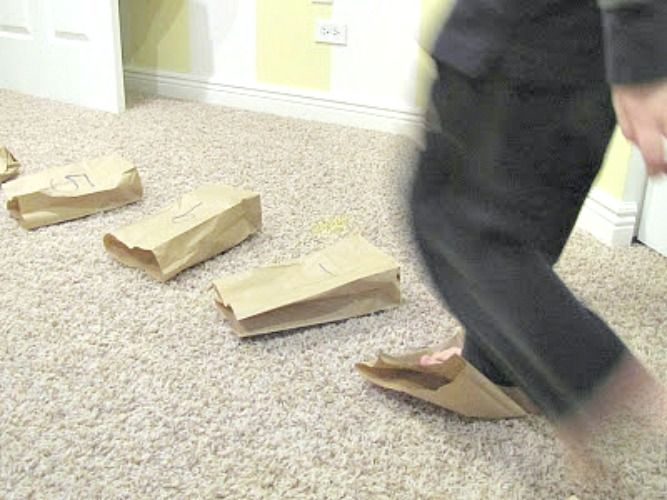
Grab some paper bags and number them, then shake them out and lay them in a number line. Now, call out an addition or subtraction problem, like 3 + 2. Have a student stomp on the bag labeled three, then on the next two to arrive at an answer of five. (Feeling brave? Try this one with balloons!)
Learn more: Schooltime Snippets
6. Grow fact-family flowers
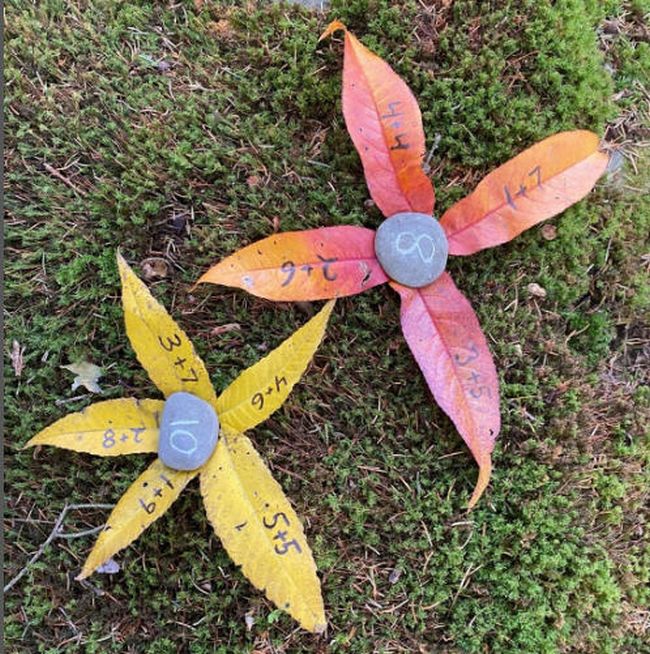
Pick up colorful fall leaves and write math facts on them. Gather them around a numbered rock to make pretty flowers.
Learn more: @discoverwildlearning
7. Toss beanbags to learn place value
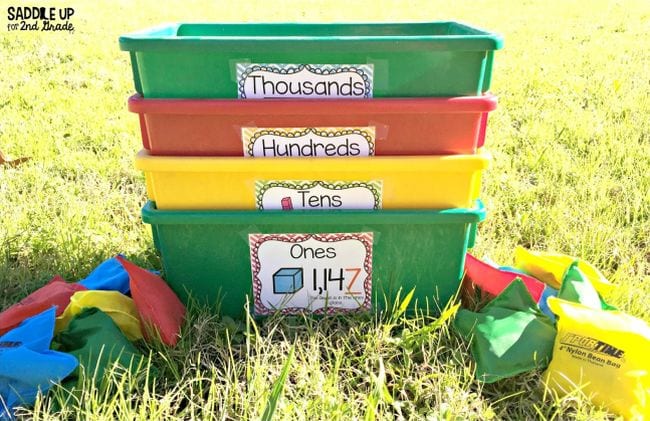
Label bins with place values like ones, tens, and hundreds. Kids toss beanbags into the bins, then count them and see what number they’ve created.
Learn more: Saddle Up for Second Grade/Place Value Toss
8. Form paper-plate number bonds
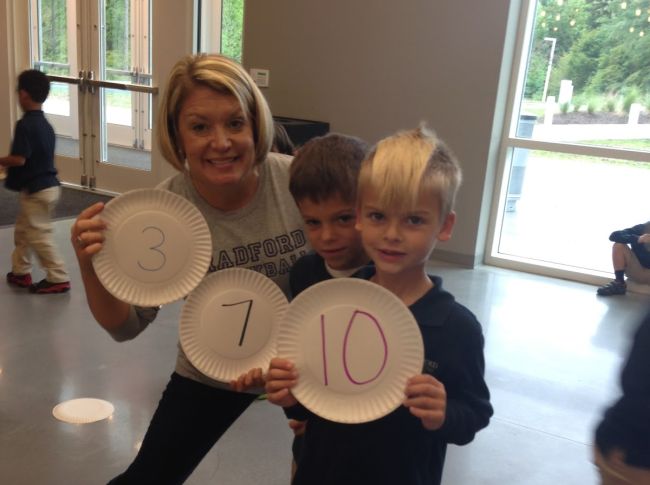
Pass out numbered paper plates, then have students mix and mingle to see how many number bonds they can form.
Learn more: The Schroeder Page
9. Create a life-size number line
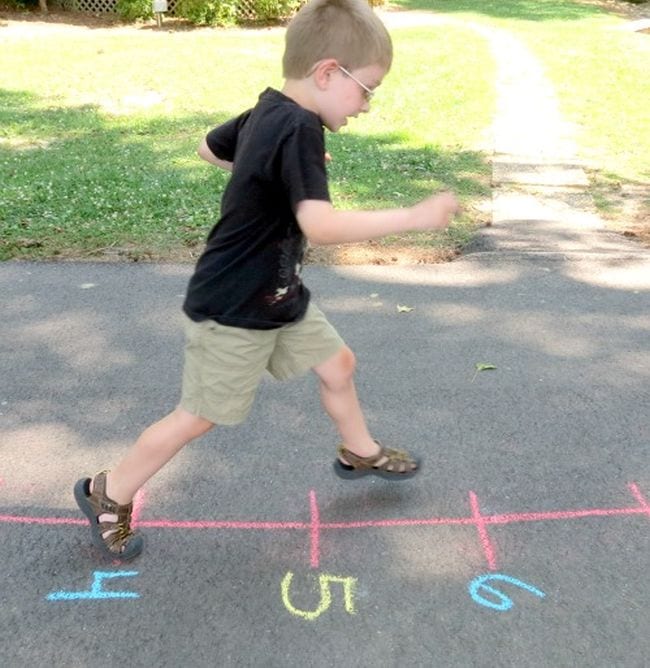
Number lines are wonderful for all sorts of math games and activities. Make one big enough for kids to stand and jump around on using sidewalk chalk (or painter’s tape indoors). You’ll use it over and over again.
Learn more: Childhood Beckons
10. Hit the target and graph
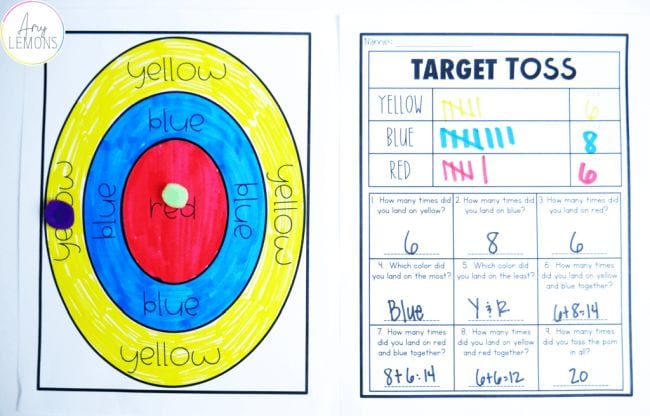
You can teach graphing in lots of ways, so why not make it active? Students throw balls onto a target, graphing and analyzing their throws as they go.
Learn more: Amy Lemons
11. Head out on a plot graph scavenger hunt
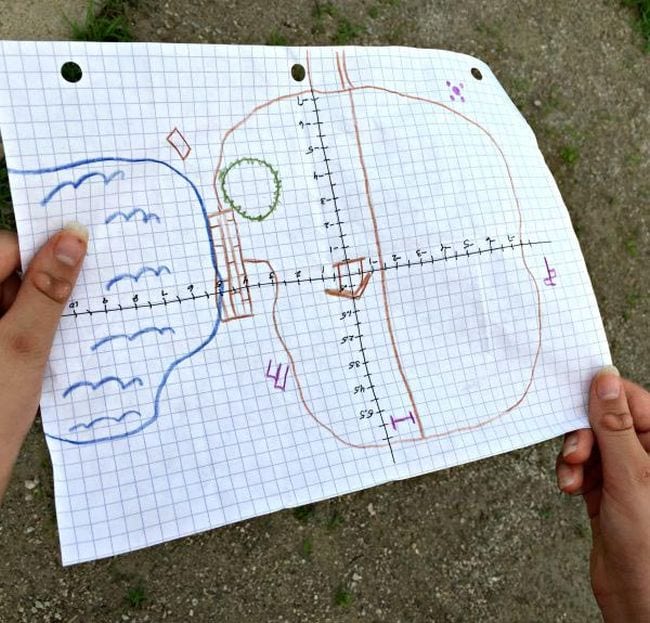
Create a map of your school, playground, or other area using graph paper (or even better, have kids help you do it). Then choose plot points for them to visit to find notes or small prizes. They’ll feel like real treasure hunters!
Learn more: Edventures With Kids
12. Roll the dice to count and move
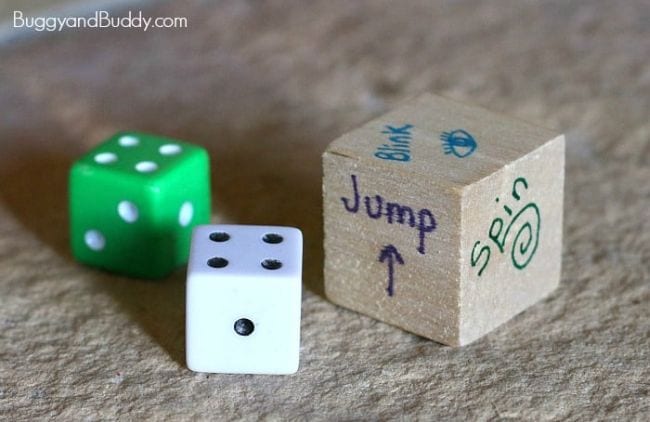
Get practice with low-number counting and addition using action dice. Write activities like “jump,” “clap,” or “stomp” on a small wooden block, then roll it along with a pair of dice. Kids add them up (or subtract if you prefer) and complete the activity the number of times shown.
Learn more: Buggy and Buddy/Math Dice
13. Whack a ball to subtract
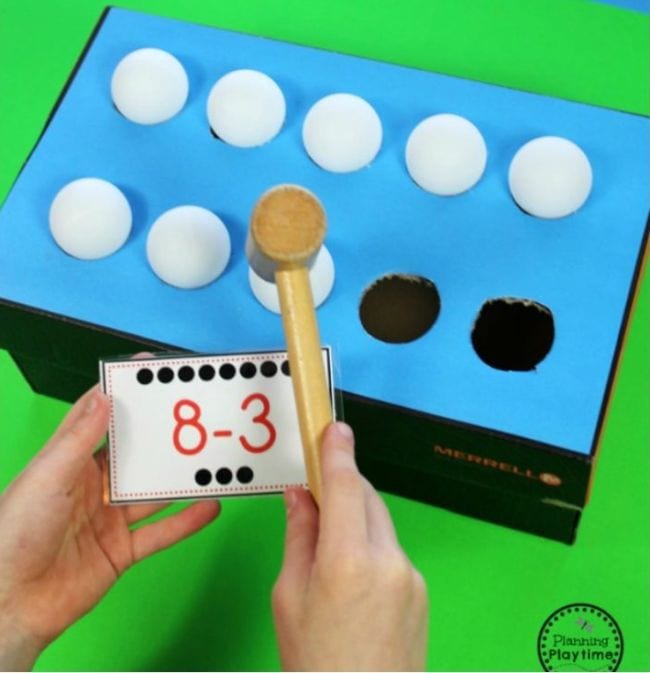
You know your elementary math students are going to love this! Build your own whack-a-mole 10-frame with a shoebox and Ping-Pong balls. Then, have kids whack the balls to practice their subtraction facts. So fun!
Learn more: Planning Playtime
14. Make a splash with water balloons
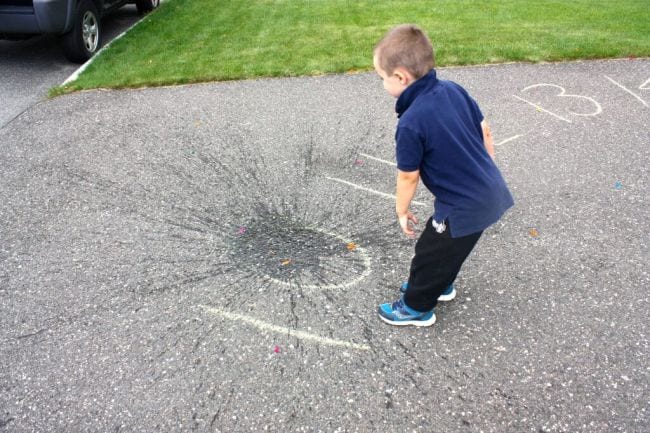
You’re going to need to be willing to get a little wet for this one, but kids simply adore math games (or any games!) with water balloons. Fill and label balloons numbered 1 through 20 (or whatever numbers you’re working on). Draw the numbers in a big circle on the playground. Then, have a student choose a balloon, find the matching number, and head off to make a splash!
Learn more: Little Bins for Little Hands
15. Tell time on a giant clock
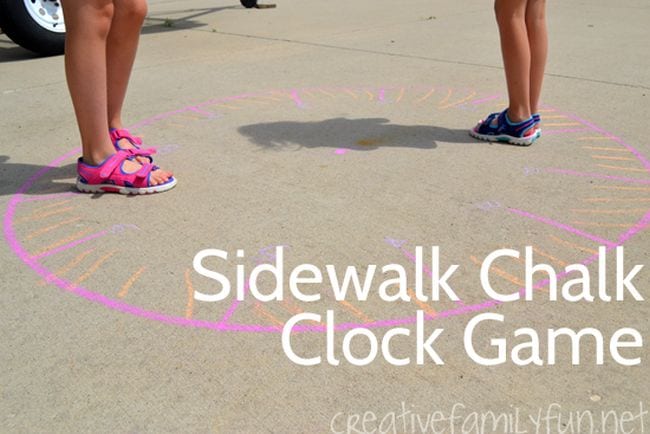
Draw a giant clock face with hours and minutes on the playground with sidewalk chalk. Choose two students to be the hour and minute hands, then call out a time and send them out to become the clock. Add more complicated elements by having them add to or subtract from the initial time too. (“Now it’s 23 minutes later!”)
Learn more: Creative Family Fun/Sidewalk Chalk Clock
16. Measure your frog jumps
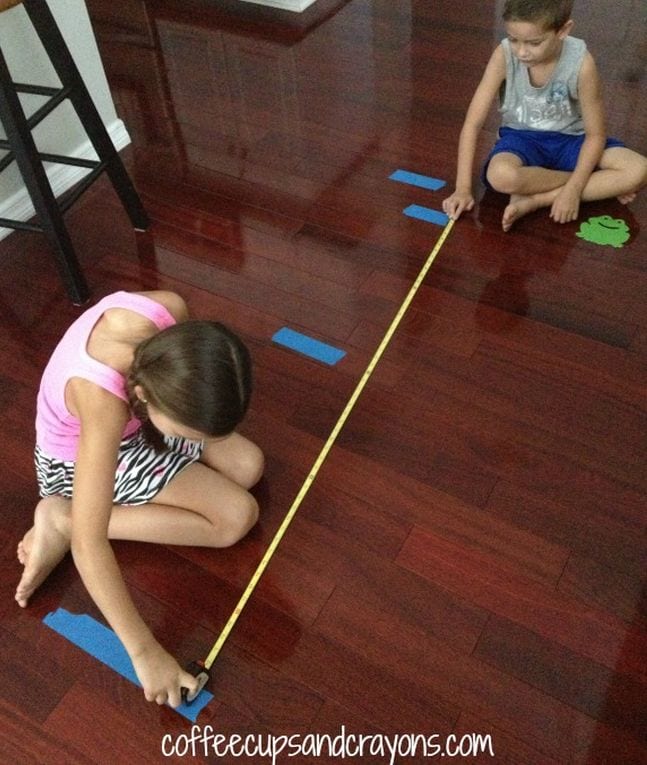
Have your students hop like frogs, leap like gazelles, or jump like kangaroos. Then, pull out the ruler or measuring tape so they can measure the distances they’ve covered.
Learn more: Coffee Cups and Crayons
17. Jump to math facts practice
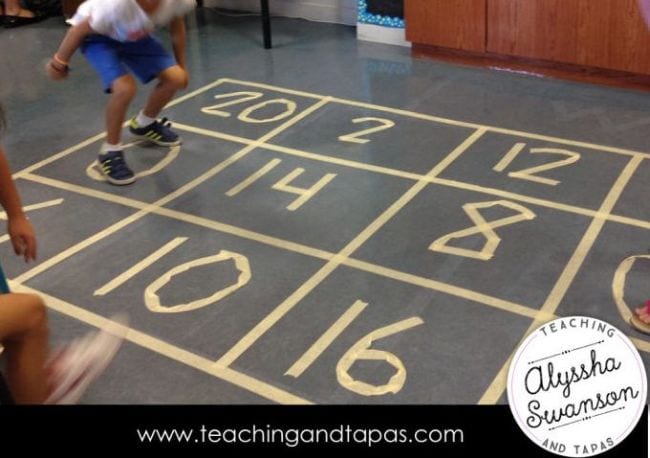
Lay out a grid like the one shown that has the answers to whatever set of math flash cards you’re currently working with. (This teacher used masking tape; you could also do sidewalk chalk on the playground.) Two players face off, one on each side of the board. Show the flash card, and kids race to be the first to jump to the correct square with both feet inside the lines. Get all the rules at the link below.
Learn more: Teaching and Tapas
18. Run a flash-card race
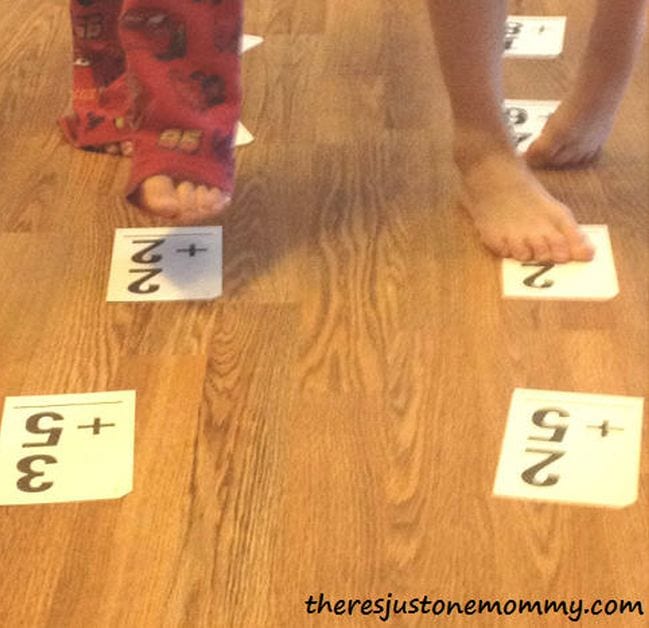
Tape a series of flash cards to the floor and challenge kids to see who can correctly make their way from start to finish the fastest. They can call out the answers or write them down, but they have to get it right before they move on. Kids can race side by side or work independently to beat their own best time.
Learn more: There’s Just One Mommy
19. Catch a math beach ball
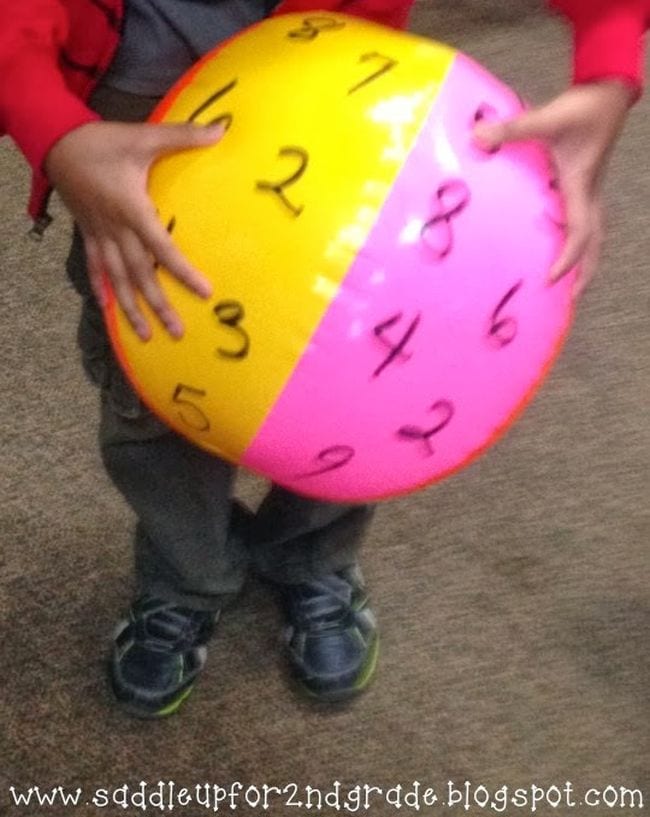
Beach balls are so much fun in the classroom. Scribble numbers all over one with a Sharpie, then toss it to a student. Wherever their thumbs land, they add (or subtract or multiply) those two numbers together before tossing the ball to the next student.
Learn more: Saddle Up for Second Grade/Beach Ball Math
20. Do a number dance
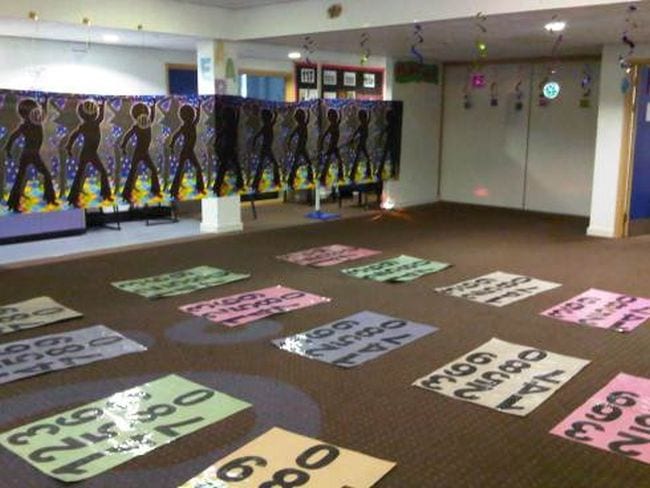
Kids who love “Dance Dance Revolution” will get into this one. Make a number mat for each student like the ones shown. Flash an equation with an answer between 10 and 99 on the screen. Kids figure out the answer and jump to put their left foot on the correct tens place, right foot on the ones. They’ll be dancing and spinning as they learn!
Learn more: Number Loving
21. Groove with angles
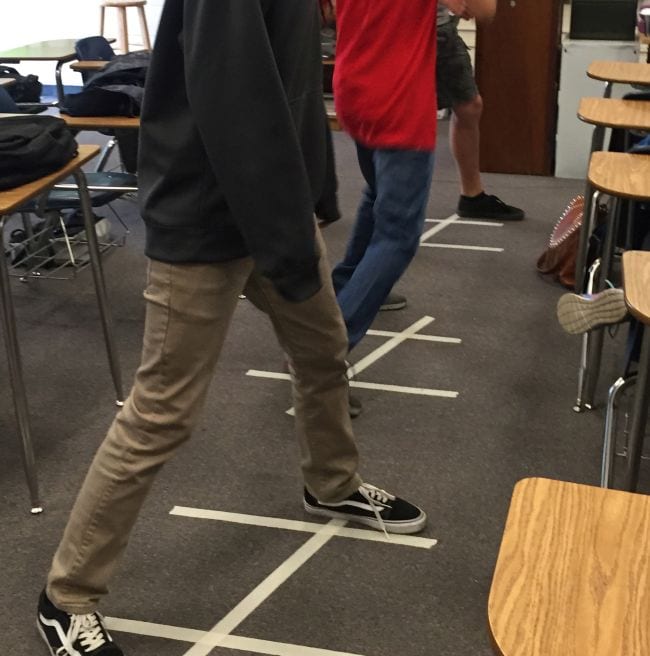
Teach kids about transversals and the angles they create with some fun dance moves! Get the details for “Dance Dance Transversal” at the link below.
Learn more: Communicating Mathematically
22. Add and subtract by stacking cups
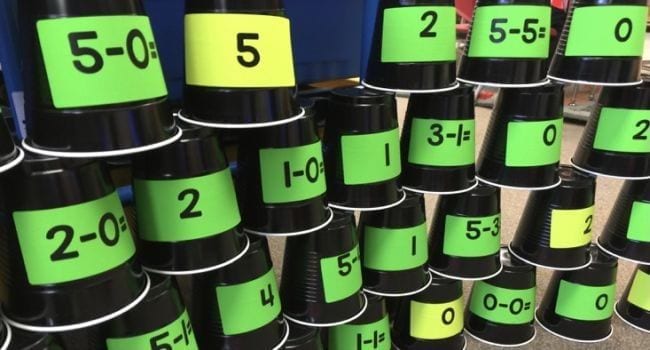
We’re not sure why, but kids simply love stacking cups. Label yours with math problems and answers, then have kids build pyramids and towers galore!
Learn more: The Kindergarten Smorgasboard
23. Measure the height of a tree (no ladder needed)
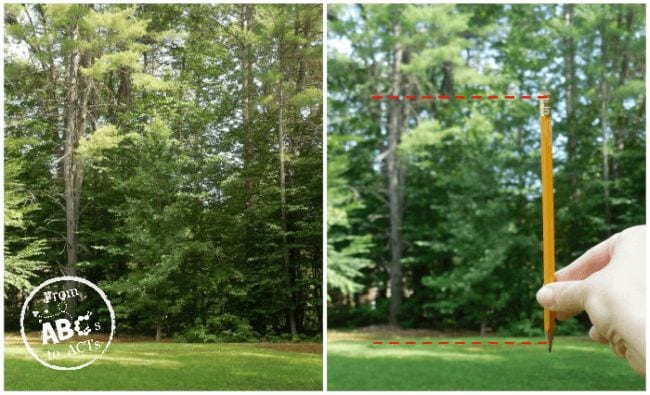
Kids will be amazed to learn they can measure the tallest tree while keeping their feet on the ground. The link below walks you through the steps with a free printable.
Learn more: From ABCs to ACTs
24. Count and learn on a nature walk
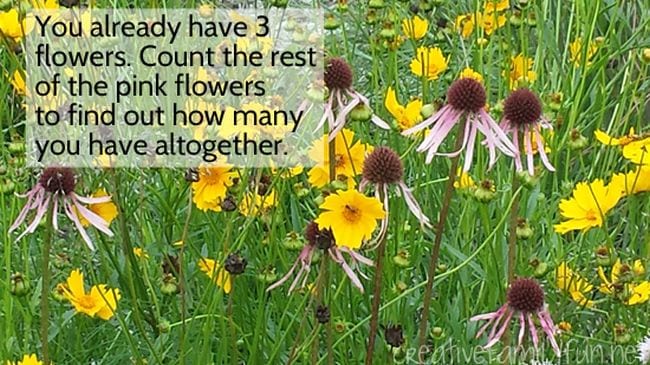
Take an outdoor stroll and practice basic math along the way. This works indoors too—walk the school hallways (quietly) and count doors, windows, posters, and more.
Learn more: Creative Family Fun/Math Walk
25. Hunt for shapes in the world around you
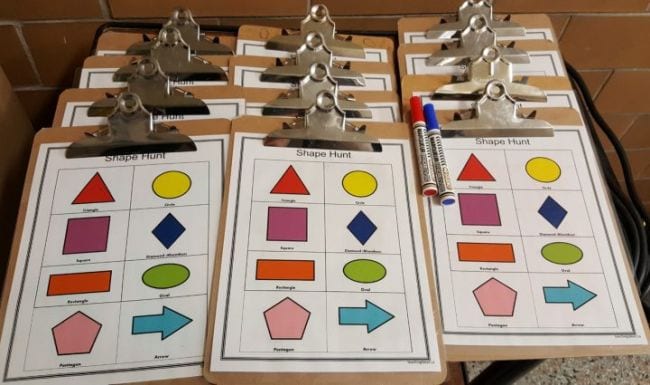
Looking for super-simple and fun active math games? Give students a sheet with shapes to find as you walk around the school or playground. Each time they find the shape, have them trace it on their worksheet and then make a mark to keep track of how many times they’ve seen it.
Learn more: Hands-On Teaching Ideas
26. Steal the balls with addition robbery
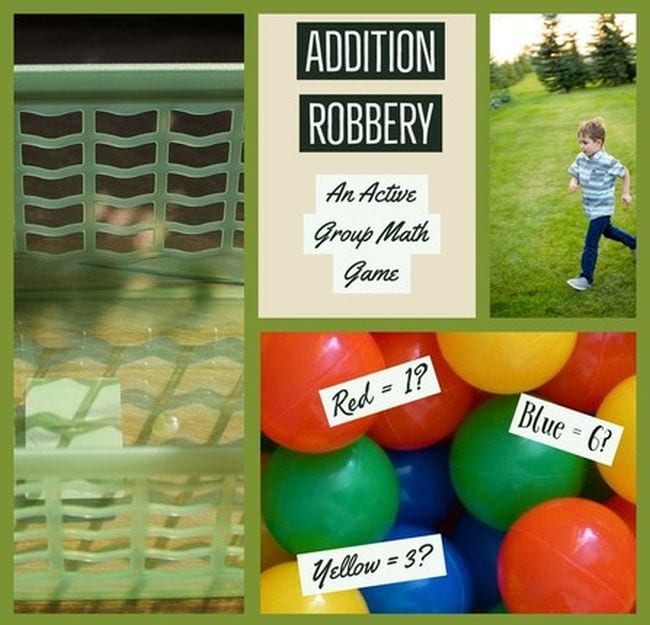
Kids compete to see whose basket of balls will add up to the highest amount. The trick? They don’t know at the beginning which balls are worth the most. Learn how to play at the link below.
Learn more: That After School Life
27. Puddle-jump from number to number
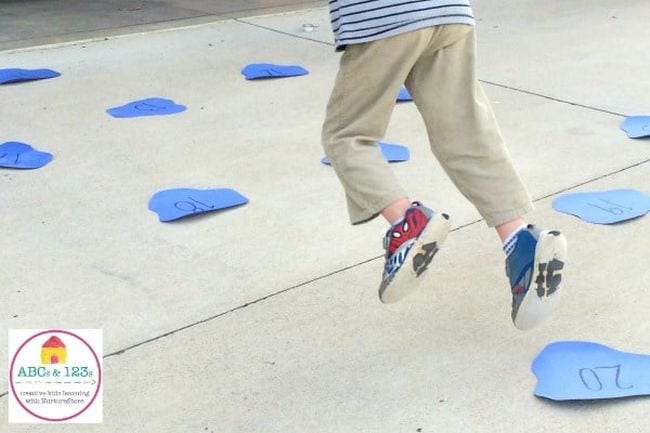
Lay out a series of construction paper puddles labeled with numbers. You can call out numbers and have kids jump to the correct one, or have them jump from one to the next in order forward or backward, or even try some skip counting.
Learn more: NurtureStore
28. Paint and hide number rocks
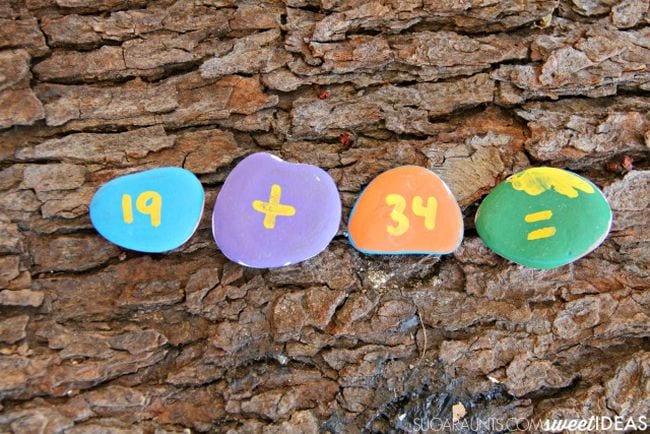
Painted rocks are always a big hit! Have your class help you make these, then hide them around the playground and send kids off to find and answer equations.
Learn more: The OT Toolbox
29. Skip-count along a hopscotch board
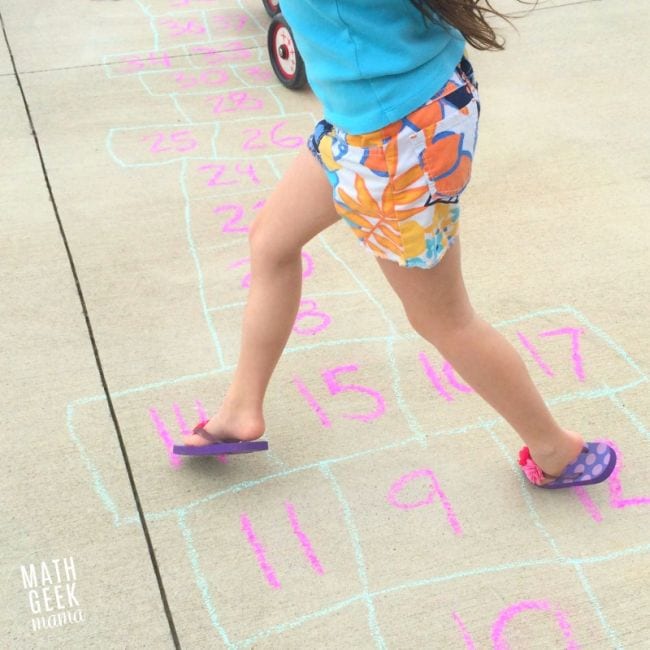
A hopscotch board can be used for a lot of fun and active math games. Try it for skip counting: Kids hop along counting by 2s, 5s, 10s, or whatever you’re currently working on. Learn more at the link below.
Learn more: Math Geek Mama/Skip-Counting Hopscotch
30. Aim and throw to practice math skills
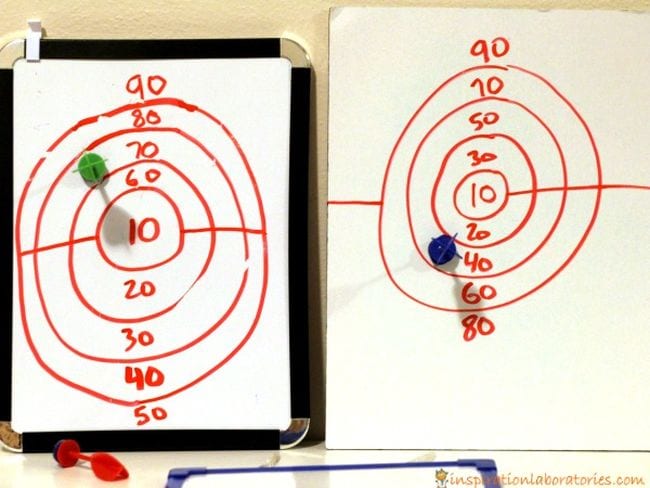
Pick up a set of Sticky Darts and draw two dartboards side by side. You can label the rings with any numbers you like. Kids throw the darts and then add, subtract, multiply, or divide the numbers—your choice!
Learn more: Inspiration Labs
31. Design an outdoor board game
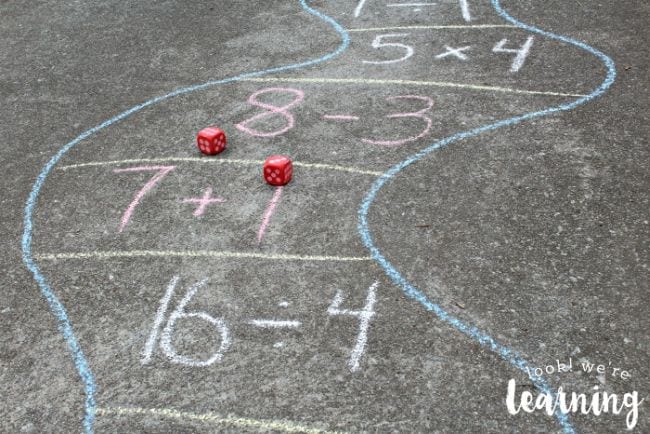
Draw a winding path and fill the spaces with math equations. Kids roll the dice and move from space to space (have them jump, skip, or twirl to mix things up). If they get the answer right, they move to the new space. If not, their turn is over. Customizable math games like this can be used at any level.
Learn more: Look! We’re Learning!
32. Turn UNO into an active math game
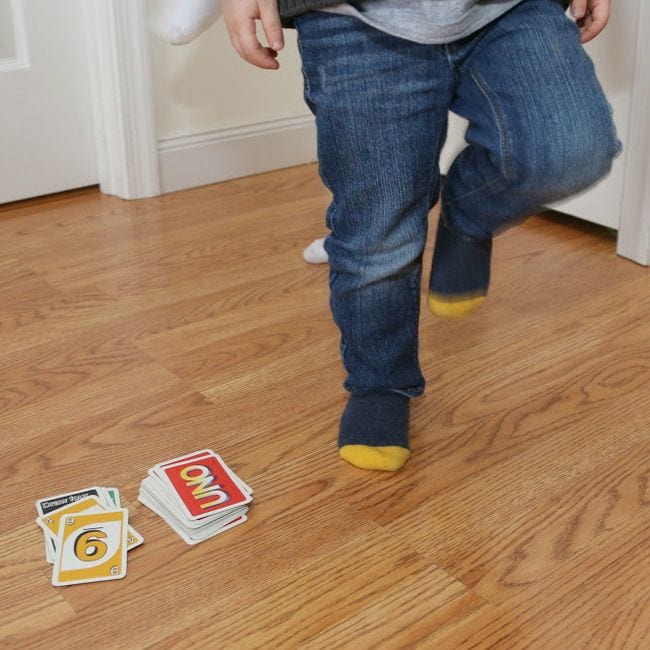
Grab your UNO deck and get ready to move! Assign each color a movement (hop, touch toes, etc.). As kids draw the cards, everyone completes the movement the correct number of times. Skip and Reverse work as usual, but anyone who gets Draw Two has to draw two more cards and complete the actions on their own while others cheer them on. See more at the link below.
Learn more: Still Playing School
33. Bowl them over while learning math facts
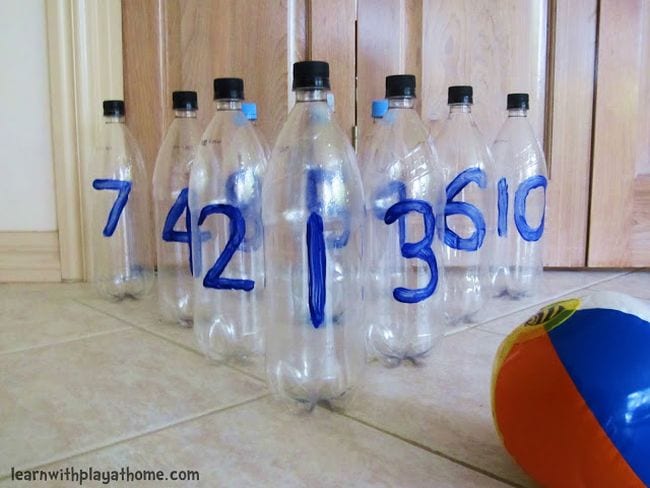
Active math games using recycled materials are economical and good for the environment. Set up empty plastic bottles labeled 1 through 10, then roll the ball to see how many you can knock down. Add up the numbers of the knocked-over bottles to get your score.
Learn more: Learn With Play at Home
34. Compete to win at putt-putt math
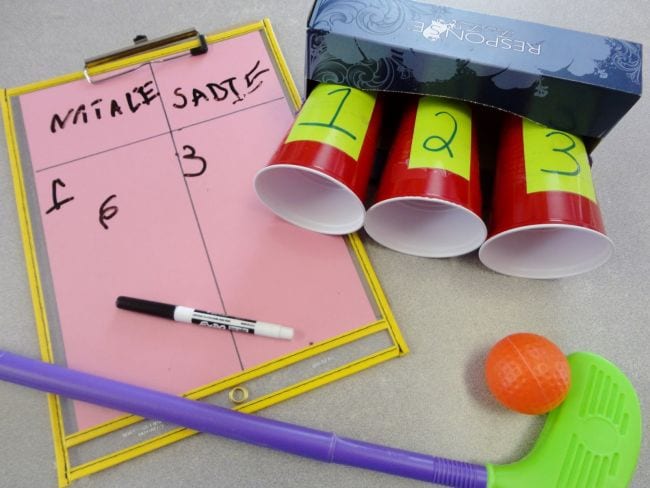
Pick up a few dollar-store supplies and make your own putt-putt course. This can be a simple game where kids simply shoot for the highest (or lowest) number. But you can also drive up the complexity by putting equations on the cups that kids have to solve first to determine which is the best cup to aim for.
Learn more: My Catch a Star Classroom!
35. Give a classic game a math twist
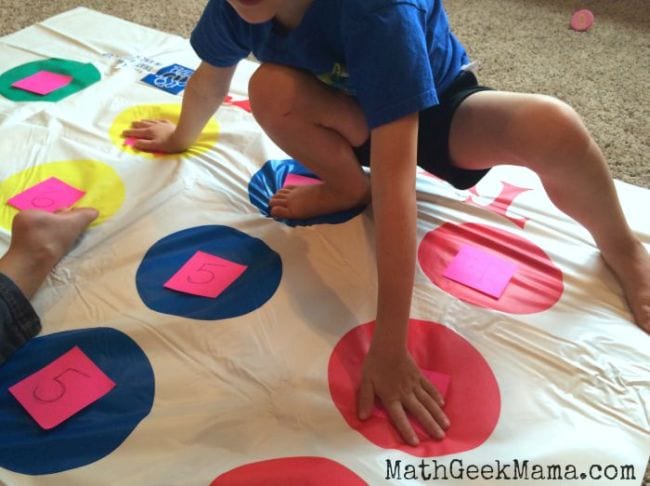
Create active math games that give new life to existing resources. For example, add numbers to Twister! For more advanced players, instead of saying “Right hand 5,” try saying “Right hand 14 – 9” to make them think.
Learn more: Math Geek Mama/Twister Math
If you like these active math games and are looking for more ways to move in the classroom, try these 21 Kinesthetic Reading Activities for your most active learners.
Plus, sign up for our free newsletters to get all the best teaching tips and ideas!
